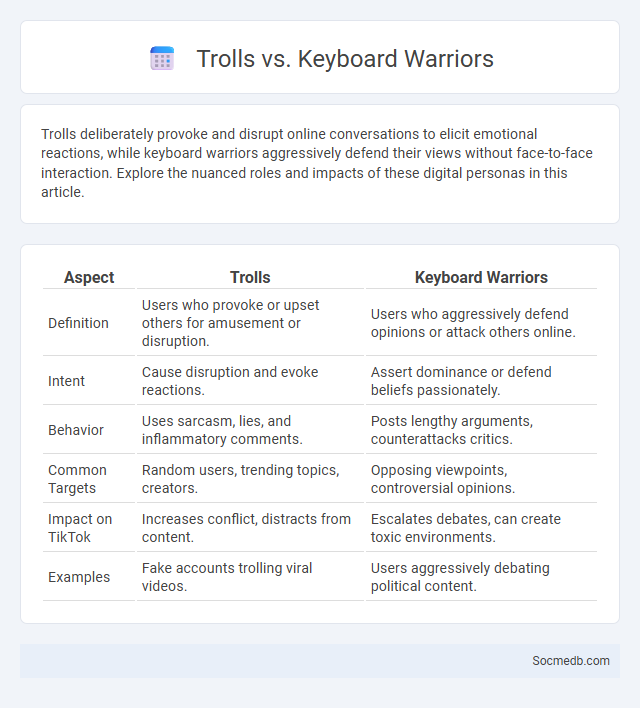
Photo illustration: Trolls vs Keyboard Warriors
Trolls deliberately provoke and disrupt online conversations to elicit emotional reactions, while keyboard warriors aggressively defend their views without face-to-face interaction. Explore the nuanced roles and impacts of these digital personas in this article.
Table of Comparison
| Aspect | Trolls | Keyboard Warriors |
|---|---|---|
| Definition | Users who provoke or upset others for amusement or disruption. | Users who aggressively defend opinions or attack others online. |
| Intent | Cause disruption and evoke reactions. | Assert dominance or defend beliefs passionately. |
| Behavior | Uses sarcasm, lies, and inflammatory comments. | Posts lengthy arguments, counterattacks critics. |
| Common Targets | Random users, trending topics, creators. | Opposing viewpoints, controversial opinions. |
| Impact on TikTok | Increases conflict, distracts from content. | Escalates debates, can create toxic environments. |
| Examples | Fake accounts trolling viral videos. | Users aggressively debating political content. |
Understanding Trolls: Who Are They Really?
Trolls on social media are individuals who intentionally provoke or disrupt conversations by posting inflammatory, irrelevant, or offensive messages to elicit emotional responses. They often exploit anonymity and the lack of immediate consequences online to spread misinformation, harass others, or influence public opinion. Understanding their motives--including seeking attention, expressing frustration, or manipulating discourse--helps platforms develop effective moderation strategies to maintain healthy digital communities.
Defining Keyboard Warriors in the Digital Age
Keyboard warriors in the digital age are individuals who aggressively express opinions or engage in confrontations on social media platforms, often hiding behind the anonymity provided by the internet. These users frequently use provocative language to influence discussions or intimidate others, impacting online communities and discourse. Understanding the behavior of keyboard warriors can help you navigate social media more safely and promote healthier digital interactions.
Trolls vs Keyboard Warriors: Key Differences
Trolls thrive on creating chaos by posting inflammatory or off-topic messages to provoke emotional responses and disrupt conversations, while keyboard warriors aggressively defend their viewpoints online, often engaging in confrontational debates. Your social media experience can be significantly affected by recognizing these behaviors, as trolls seek to derail discussions for amusement, whereas keyboard warriors aim to assert dominance in arguments. Understanding these key differences helps you navigate online interactions more effectively and maintain a healthier digital environment.
Motivations Behind Trolling and Keyboard Warring
Trolling and keyboard warring often stem from a desire for attention, power, or control within online social media environments. These behaviors can also be driven by frustration, anonymity, and the lack of immediate real-world consequences, encouraging users to express aggressive or provocative opinions. Understanding these motivations can help you navigate social networks more effectively, reducing the impact of such negative interactions on your digital experience.
Common Tactics Used by Trolls Online
Trolls on social media frequently employ tactics such as spreading misinformation, using inflammatory language, and targeting individuals or groups with personal attacks to provoke emotional responses and disrupt conversations. They often create fake profiles or bots to amplify harmful content and manipulate public opinion. Coordinated harassment campaigns and the exploitation of trending hashtags further enhance their online presence and impact.
How Keyboard Warriors Influence Online Discourse
Keyboard warriors shape online discourse by aggressively pushing their opinions, often escalating conflicts and polarizing conversations on platforms like Twitter, Facebook, and Reddit. Their persistent confrontational style amplifies negativity, deterring constructive dialogue and fostering echo chambers where misinformation proliferates. This behavior significantly impacts the quality of digital communication, influencing public perception and social dynamics in virtual communities.
Psychological Impact of Trolls and Keyboard Warriors
Exposure to social media trolls and keyboard warriors can significantly heighten anxiety, depression, and feelings of social isolation among users. These individuals often engage in targeted harassment, spreading negativity that undermines victims' self-esteem and mental well-being. Research indicates that prolonged online abuse disrupts cognitive function and increases the risk of developing post-traumatic stress symptoms.
Strategies for Dealing with Internet Confrontations
Effective strategies for dealing with internet confrontations include maintaining a calm and respectful tone to de-escalate tensions and avoid further conflict. Focus on addressing the issue with clear, fact-based responses, avoiding emotional or aggressive language that can exacerbate the situation. You can also utilize platform tools such as blocking, reporting, or muting to protect your digital space and maintain a positive online environment.
Societal Consequences of Digital Conflict
Digital conflicts on social media platforms exacerbate societal polarization, spreading misinformation and intensifying echo chambers that reinforce existing biases. The rapid dissemination of hostile content contributes to mental health issues, including anxiety and depression, particularly among vulnerable populations. Persistent digital confrontations undermine public trust in institutions and challenge democratic processes by distorting public discourse.
Fostering Healthier Online Communities
Promoting positive interactions on social media platforms reduces cyberbullying and misinformation, creating safer digital environments. Implementing advanced content moderation algorithms and providing user education empower individuals to engage respectfully and responsibly. Social media companies investing in transparent policies and community guidelines enhance trust and foster healthier online communities.
 socmedb.com
socmedb.com